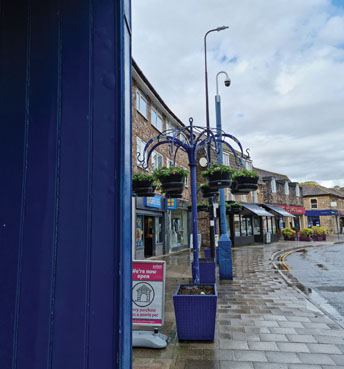Since the July print edition of Professional Security magazine we have been featuring local government CCTV which – after the public sector austerity of the 2010s – is seeing widespread investment in new kit, as ageing analogue cameras and recorders are replaced with digital equivalents.
Besides those physical changes, new thinking is developing public space surveillance; some police and crime commissioners are taking a lead on provision, notably in mid-Wales, and Cumbria. For the first time since the early 2000s, central government is offering capital sums, typically in six-figures, for updating of kit. Add the capabilities of IP cameras and cloud storage, and it all means that public space cameras can return to small and rural towns, that tended to be the first and most likely places to see those services cut or taken away altogether, as Coalition and then Conservative central government austerity took hold in councils from 2010. More in the October and November print editions of Professional Security.
For example in Lancashire at a recent meeting of Fylde Council Environment, Health and Housing Committee, councillors agreed to approve the replacement of the town centre cameras in St Annes, Lytham and Kirkham in principle, subject to capital budgetary provision being confirmed through the 2022/23 budget. The council proposes that four rapid deployable cameras will replace its two CCTV vans, and the town and parish councils will be encouraged to fund further supplementary cameras to ensure a thorough coverage of the borough. A similar way of affording cameras in small towns is featured in the September print edition of Professional Security magazine, in the case of Weston super Mare-based North Somerset Council (pictured: Portishead).
Fylde says that it’s keen to improve the CCTV provision across the borough because of its remit for community safety and its status as the statutory crime and disorder committee for the purposes of the Police and Justice Act 2006. The council controls 15 static CCTV cameras in town centre locations. The cameras are in in St Annes (eight cameras), Lytham (four) and Kirkham (three). The cameras are maintained under an agreement with neighbouring Blackpool Council and operated and monitored through an arrangement with Wyre Council, which oversees the Fylde CCTV operations.
As for the usefulness of the town centre cameras, data from autumn 2019 to winter 2020 showed that 2133 incidents were recorded in St Anne’s town centre alone. These were classified by the police as including 198 nuisance incidents, 47 suspicious circumstances, 177 concern for safety and 143 thefts. In Lytham, 547 incidents were recorded, and Kirkham 677, all including nuisance, suspicious circumstances and theft as in St Annes.
As elsewhere Fylde’s two CCTV vehicles were moved to address problem areas on a temporary basis. Instead rapid redeployable cameras (RRCs) will deliver live and recorded high‐definition images via 4G mobile transmission.
The costs of this new provision of CCTV; just over £76,000, and the Budget Working Group has recommended that funding for replacing the present town centre cameras be included in the budget for 2022/23. More on the Fylde Council website.
Councillor Tommy Threlfall, Chair of the Environment, Health and Housing Committee said: “Community safety is greatly important to us at Fylde. Having effective CCTV across the borough’s town centres and hot spots is imperative to keeping our residents and visitors safe. It is clear from the number of incidents recorded throughout 2019 – 2020 that CCTV is a necessity in not only tackling crime and anti-social behaviour, but in helping the Police to bring those responsible to justice.
“We are fully committed at the Council to always striving to improve services which benefit the Borough and help to keep it safe. The new CCTV provision looks to do just this, and we are looking forward to having a modern, reliable and rapidly available service when required.”
Councillors also heard at the meeting of a CAP to tackle underage drinking in the area – a Community Alcohol Partnership, launched on September 7 to improve the health and wellbeing of local young people. The CAP will work with youth services and local groups to provide alcohol-free leisure and sports activities for the young.










